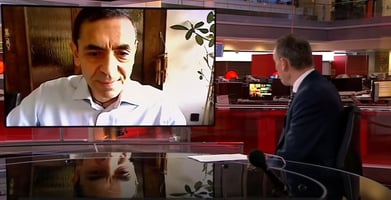It is not often a spokesperson feels the need to apologise after a media interview.
It must be one of the most critically and closely observed performances by any boss on his arrival at a major organisation. Tony Hall’s comments at New Broadcasting House as he took on the role of the director general of the BBC, were well judged and very well delivered. How different from the performance of his predecessor, George Entwistle, on the Today programme which we discussed in an earlier blog.
The fact that his appointment was so well received and that this weekend’s papers have made little mention must be a source of huge relief to both Hall and Lord Patten who stood beside him while he spoke.
So, what does Tony Hall do right?
As we explain in our media training and presentation courses, words and content aside, how you stand and how you look creates a huge impact on the audience. Here Tony Hall looks relaxed but well anchored to the ground. His body language is open and confident. He scans his audience with his eyes as he speaks and he uses his hands in a natural way to help emphasise key words and phrases.
00.25 seconds
After making a few general comments, Hall is soon sounding passionate and inspiring, using his hands to emphasise his point. “It’s one of those extraordinary organisations which is an absolutely essential part of the UK, of Britain, of who we are.” Notice how he also uses the “power of three” here. Julius Caesar’s “I came, I saw, I conquered,” is probably the most famous of example of this rhetorical device but you’ll hear many more times if you listen out for it. They’re a great way of emphasising a point.
00.37 seconds
He’s honest with his audience here. “It’s been a really tough few weeks,” he says. There are no clever phrases or euphemisms and no suggestions of spin doctoring here. These would just insult the media savvy audience that he is most concerned with. Instead, Hall is honest and does not pull any punches
00.42 seconds
But then he quickly goes onto the positive. “I know we can get through it…”
1 minute 1 second
He talks of the “best and brightest” at this point. The new DG also uses natural language and anyone looking to play corporate buzzword bingo would be sorely disappointed. There’s no “leveraging” or “mission statements” here. But simple language doesn’t mean boring language. This phrase and others such as “I care passionately” really stand out. His intonation varies as he speaks and here his voice rises and his pace increases as he talks about issues such as “creativity” and his ambitions for the BBC.
1 minute 15 seconds
He looks down briefly. This is a great way in a presentation or speech of signally a change of mood and of subject matter.
1 minute 18 seconds
“If you’re going to run a creative organisation you need a team.” Again Hall opts for simple, familiar phrases. His use of the second person is interesting, as well. “You,” is much more engaging for the audience than talking about “they” or “them”. Hall is now talking to us, the audience, directly, it seems.
1 minute 21 seconds
“I know that from my earliest days as news trainee in this organisation, through to my latter days, running the BBC News, through to now at the Royal Opera House...” During interviews and presentations introducing personal experience and your own history is a great way to back up your argument and give it authority, as well as playing up the human element in your comments.
Audiences are made up of human beings and so they respond to the human element of a presentation – far more than with facts, figures and ideas, however important these might be. Hall is also subtly emphasises his relevant skills and experience here without appearing to boast.
2 minutes 3 seconds
“I hope you’ll forgive me.” A gentle smile here works well to emphasise this apparent humility but also to vary his tone and style. It also makes clear that he is a real human being with real emotions rather than simply a corporate spokesperson. Notice how he lowers his voice and slows his pace here.
2 minutes 13 seconds
“Please give me some space and then in a few weeks let’s come back and I'm very happy to answer questions and do interviews,” he says politely but firmly. He’s taking charge here and letting journalists know when they’ll receive some more information, thereby giving himself a breather.
One of the other noticeable features about Tony Hall’s speech is that it’s short - just over two and a half minutes. Saying all that you want to say in a limited amount of time is always a challenge. But Hall clearly understands that saying too much could make him a hostage to fortune at this stage. So he is brief and to the point – and in corporate communications that’s always a good thing.
You can listen to the full statement here




